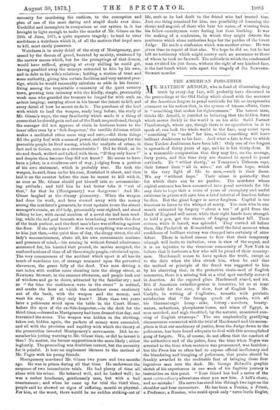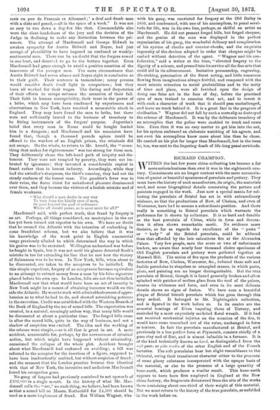THE AMERICAN FORGERIES.
f R. MATTHEW ARNOLD, who is fond of illustrating deep AI truth by every-day fact, will probably have discerned in the proceedings at the Old Bailey which closed with the sentence of the American forgers to penal servitude for life no inexpressive comment on his notion that, in the system of human affairs, there is "something that makes for righteousness." The honest man, thinks Mr. Arnold, is justified in believing that the hidden force which moves darkly in the world is on his side. Solid Farmer Flamborough, whose eye, though there is no speculation in it to speak of, can look the whole world in the face, may count upon " something " to "make" for him, which something will leave brilliant Jenkinson to his fate. And what a fate is that to which these Yankee Jenkinsons have been left ! Only one of the forgers is upwards of thirty years of age, and he is but thirty-four. It is a reasonable computation that they may live, on the average, forty years, and this time they are doomed to spend in penal servitude. To "wither slowly," as Tennyson's Tithonus says, their former lives " all in ashes," cut off from hope, which is the very light of life to men,—such is their doom. We say "without hope." Their crime is pointedly that for which there can be no pardon. The murderer whose capital sentence has been commuted into penal servitude for life may dare to hope that a score of years of exemplary and useful existence in prison will earn him a brief interval of freedom before lie dies. But the giant forger is never forgiven. Capital is too timorous to listen to the whisper of mercy. The men who in one mouth extracted by forgery " about a ton" of gold from the Bank of England will never, while their right bands have strength to hold a pen, get the chance of forging another bill. Their success, while it lasted, was splendid. They carried all before them, like Frederick at Kunersdorf, until the fatal moment. when confidence of brilliant victory was changed into certainty of utter defeat. There is indeed reason to fear that their temporary triumph will incite to imitation, even in view of the sequel, and it is no injustice to the vivacious community of New York to believe that it harbours a few who will be proud of their country- men. Macdonnell seems to have spoken the truth, except as to the date when the idea struck him, when he said that the method or principle of the fraud was suggested to him by his observing that, in the protective chain-mail of English commerce, there is a missing link at a vital spot carefully covered in America. At the exposed place Macdonnell aimed, and bit. But if American swindler-genius is inventive, let us at least take credit for the sure, if slow, foot of English law. Mr. Carlyle, in writing of Cagliostro, remarks with patriotic satisfaction that "the foreign quack of quacks, with all his thaumaturgic hemp - silks, lottery. numbers, beauty- waters, seductions, phosphorus-boxes, and wines of Egypt, is seen matched, and nigh throttled, by the natural, unassisted cun- ning of English attorneys." The one emphatically gratifying circumstance connected with the trial of Macdonnell and his accom- plices is that our machinery of justice, from the Judge down to the policeman, has been found adequate to deal with this accomplished gang of forgers. We, of course, do not affirm that the conduct of the authorities and of the police, from the time when Noyes was arrested to the time when sentence was pronounced, was faultless ; but the Press has so often had to expose official inefficiency and the blundering and bungling of policemen, that praise should be frankly awarded to the creditable feat of bringing those four ingenious men into the dock. Mr. George Bidwell'e graphic sketch of his experiences in one week of his fugitive journey is instructive on this point. "Your friend has had a series of the most extraordinary adventures since you saw him. A hell's chase, and no mistake ! His nerve has stood him through two taps on the shoulder and four encounters. He has been a Fenian, a Priest, a Professor, a Russian, who could speak only veree leetle Engles, maie un pen de Francais et Allemand ; ' a deaf and dumb man with a slate and pencil,—all in the space of a week." It was not so easy to run down a dog-fox like that. Commendable also were the clear-headedness of the jury and the decision of the Judge in declining to make any distinction between the pri- soners. The attempt of Macdonnell and George Bidwell to awaken sympathy for Austin Bidwell and Noyes, had just enough of plausibility to have imposed on confused or weakly- sentimental men. There can be no doubt that the forgers rowed in one boat, and deserved to go to the bottom together. Even Macdonnell had grace enough to avoid a positive assertion of the innocence of the younger men. The mere circumstance that Austin Bidwell had seven aliases and Noyes eight is conclusive as to their guilt. Their sentence is tremendous ; many persons would consider death itself light in comparison ; but they have all worked for their wages. The daring and desperation of their efforts to escape enhance the sensation of their fall. Their faith in human corruptibility, their trust in the power of a bribe, which may have been confirmed by experiences and observations in New York, have received a memorable check in England. They may have found the men to bribe, but these were not sufficiently inured to the business of treachery to be fitting instruments of the forgers' purpose. Jugurtha's belief that every man in Rome could be bought landed him in a dungeon ; and Macdonnell and his associates have found that, though a thousand pounds apiece could be offered to the warders of an English prison, the criminals did not escape. On the whole, to return to Mr. Arnold, the "some- thing that makes for righteousness" was too strong for these men. They deliberately chose the left-hand path of iniquity and dis- honour. They were not tempted by poverty, they were not int- bruted by ignorance ; they invested a considerable capital in fraud rather than in honest industry. Accordingly, while they had the swindler's sharpness, the thief's cunning, they had not the steady coolness of the honest man. The gambler's fever was in their veins, the fierce thirst for unhallowed pleasure domineered over them, and they became the victims of a foolish mistake and of female weakness.
"Why should a man desire in any way To vary from the kindly race of men, Or pass beyond the goal of ordinance Where all should pause, as is most meet for all ?"
Macdonnell said, with perfect truth, that fraud by forgery is an art. Perhaps, all things considered, no masterpiece in the art has yet been turned out superior to his own. We have no doubt that he crossed the Atlantic with the intention of embarking in some fraudulent scheme, but we also believe that it was his knowledge of the weak point in English commercial usage previously alluded to which determined the way in which his genius was to be exercised. Wellington understood war before he fought in Spain, but it was not until his glance detected Soult's mistake in too far extending his line that he saw how the victory of Salamanca was to be won. In New York, bills, when about to be discounted, are taken to the acceptors to be initialled. By this simple expedient, forgery of an acceptance becomes equivalent to an attempt to extract money from a man by his false signature placed before his own eye. In London, bills are not thus initialled. Macdonnell saw that what would have been an act of insanity in New York might be a means of obtaining immense wealth on this side the Atlantic. He went to work with admirable clearness of appre- hension as to what he had to do, and showed astonishing patience in the execution. Credit was established with the Western Branch of the Bank of England by the use of sound bills. The expectation was created, in a natural, seemingly artless way, that many bills would be discounted at about a particular time. The forged bills came in after the sound bills, quite in the way of business, and not a shadow of suspicion was excited. The idea and the working of the scheme were simple,—so is all that is great in art. A mere accident, accountable for, perhaps, by the nervousness of criminal action, but which might have happened without criminality, occasioned the collapse of the whole plot. Accident brought about what Macdonnell had reckoned on avoiding ; a bill was referred to the acceptor for the insertion of a figure, supposed to have been inadvertently omitted, but without suspicion of fraud ; and the moment that the London practice became thus identical with that of New York, the inventive and audacious Macdonnell found his occupation gone.
No gang of forgers had previously contrived to net upwards of 1102,000 in a single month. In the history of what Mr. Mac- donnell calls the "art," no such thing, we believe, had been known as that a sound bill on Messrs. Rothschild for £4,500 should be used as a mere implement of fraud. But 'William Wagner, who
with his gang, was convicted for forgery at the Old Bailey in 1859, and condemned, with one of his accomplices, to penal servi- tude for life, was in his own line, perhaps, as skilful an artist as Macdonnell. He did not present forged bills, but forged cheques, and the genius of the man was displayed in the perfect organisation of his gang, the wonderful delicacy and complication of his system of checks and counter-checks, and the exquisite ingenuity of the devices adopted in order that cheques might be cashed without detection of the agent. "Wagner and his con- federates," said a writer at the time, "elevated forgery to the dignity of a science, and pressed into its service all the fine arts that could aid in its advancement. Imitative penmanship, engraving, die-sinking, personation of the finest acting, and little romances flowing from imaginations always fruitful, and composed with the most minute attention to social probabilities and to the unity of time and place, were all lavished upon the design of doing one false act in the face of day, before the practised eyes of men trained to examine that act, and to invest it with such a character of truth that it should pass unchallenged, and leave no track behind it. It is a great fact in the progress of civilisation." Wagner did not fall by such a mere slip as destroyed the scheme of Macdonnell. It was by the deliberate treachery of an accomplice that the police were enabled to track and snare him. Even then it was no easy matter to get him into the net, for his system embraced an elaborate watching of his agents, and not even his accomplices knew more about him than he chose. He carried on his plot far longer than Macdonnell, but in the issue he, too, was sent to the lingering death of life-long penal servitude.































 Previous page
Previous page